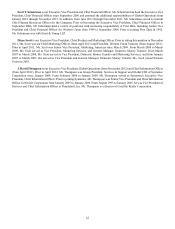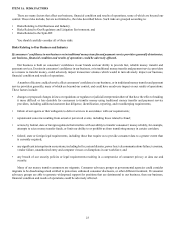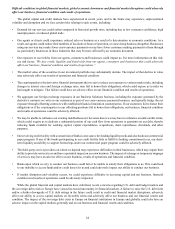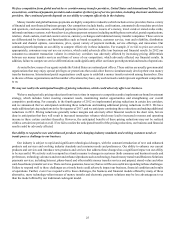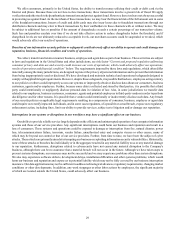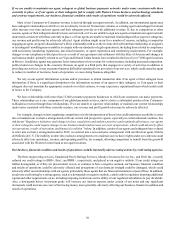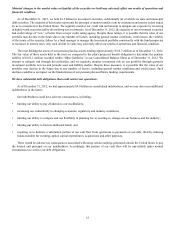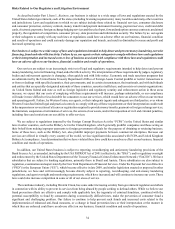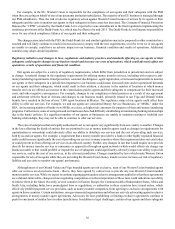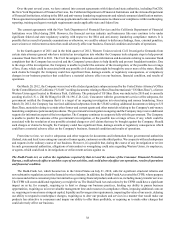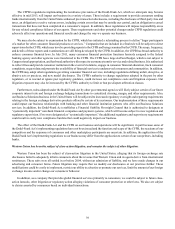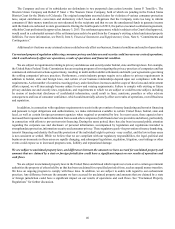Western Union 2012 Annual Report Download - page 35
Download and view the complete annual report
Please find page 35 of the 2012 Western Union annual report below. You can navigate through the pages in the report by either clicking on the pages listed below, or by using the keyword search tool below to find specific information within the annual report.30
If we are unable to maintain our agent, subagent or global business payments networks under terms consistent with those
currently in place, or if our agents or their subagents fail to comply with Western Union business and technology standards
and contract requirements, our business, financial condition and results of operations would be adversely affected.
Most of our Consumer-to-Consumer revenue is derived through our agent network. In addition, our international agents may
have subagent relationships in which we are not directly involved. Transaction volumes at existing agent and subagent locations
often increase over time and new agents and their subagents provide us with additional revenue. If, due to competition or other
reasons, agents or their subagents decide to leave our network, or if we are unable to sign new agents or maintain our agent network
under terms consistent with those currently in place, or if our agents are unable to maintain relationships with or sign new subagents,
our revenue and profits may be adversely affected. Agent attrition might occur for a number of reasons, including a competitor
engaging an agent, an agent's dissatisfaction with its relationship with us or the revenue derived from that relationship, or an agent's
or its subagents' unwillingness or inability to comply with our standards or legal requirements, including those related to compliance
with anti-money laundering regulations, anti-fraud measures, or agent registration and monitoring requirements. For example,
changes to our compliance-related practices as a result of our agreement and settlement with the State of Arizona and changes to
our business model, primarily related to our Vigo and Orlandi Valuta brands, have resulted in the loss of over 7,000 agent locations
in Mexico. In addition, agents may generate fewer transactions or less revenue for various reasons, including increased competition,
political unrest or changes in the economy. Because an agent is a third party that engages in a variety of activities in addition to
providing our services, it may encounter business difficulties unrelated to its provision of our services, which could cause the agent
to reduce its number of locations, hours of operation, or cease doing business altogether.
We rely on our agents' information systems and/or processes to obtain transaction data. If an agent or their subagent loses
information, if there is a significant disruption to the information systems of an agent or their subagent, or if an agent or their
subagent does not maintain the appropriate controls over their systems, we may experience reputational harm which could result
in losses to the Company.
We have relationships with more than 15,000 consumer payments businesses to which our customers can make payments.
These relationships are a core component of our global payments services, and we derive a substantial portion of our Consumer-
to-Business revenue through these relationships. If we are unable to sign new relationships or maintain our current relationships
under terms consistent with those currently in place, our revenue and profit growth rates may be adversely affected.
For example, changes in laws regulating competition or in the interpretation of those laws could undermine our ability to enter
into or maintain our exclusive arrangements with our current and prospective agents, especially in certain inbound countries. See
risk factor “Regulatory initiatives and changes in laws, regulations and industry practices and standards affecting us, our agents
or their subagents could require changes in our business model and increase our costs of operations, which could adversely affect
our operations, results of operations and financial condition” below. In addition, certain of our agents and subagents have refused
to enter into exclusive arrangements and in 2012, we entered into a non-exclusive arrangement with our Mexican agent, Elektra
del Milenio de C.V. The inability to enter into exclusive arrangements or to maintain our exclusive rights under our contracts could
adversely affect our operations, revenue, and operating profit by, for example, allowing competitors to benefit from the goodwill
associated with the Western Union brand at our agent locations.
Our business, financial condition and results of operations could be harmed by adverse rating actions by credit rating agencies.
The three major rating services, Standard & Poor's Ratings Services, Moody's Investors Service Inc., and Fitch Inc., recently
reduced our credit ratings to BBB+, Baa1, and BBB+, respectively, and placed us on negative outlook. If our credit ratings are
further downgraded, or if they are placed under review or continue to have a negative outlook, our business, financial condition
and results of operations could be adversely affected and perceptions of our financial strength could be damaged, which could
adversely affect our relationships with our agents, particularly those agents that are financial institutions or post offices. In addition,
an adverse credit rating by a rating agency, such as a downgrade or negative outlook, could result in regulators imposing additional
capital and other requirements on us, including imposing restrictions on the ability of our regulated subsidiaries to pay dividends.
Also, a downgrade below investment grade will increase our interest expense under certain of our notes and any significant
downgrade could increase our costs of borrowing money more generally, adversely affecting our business, financial condition and
results of operations.




